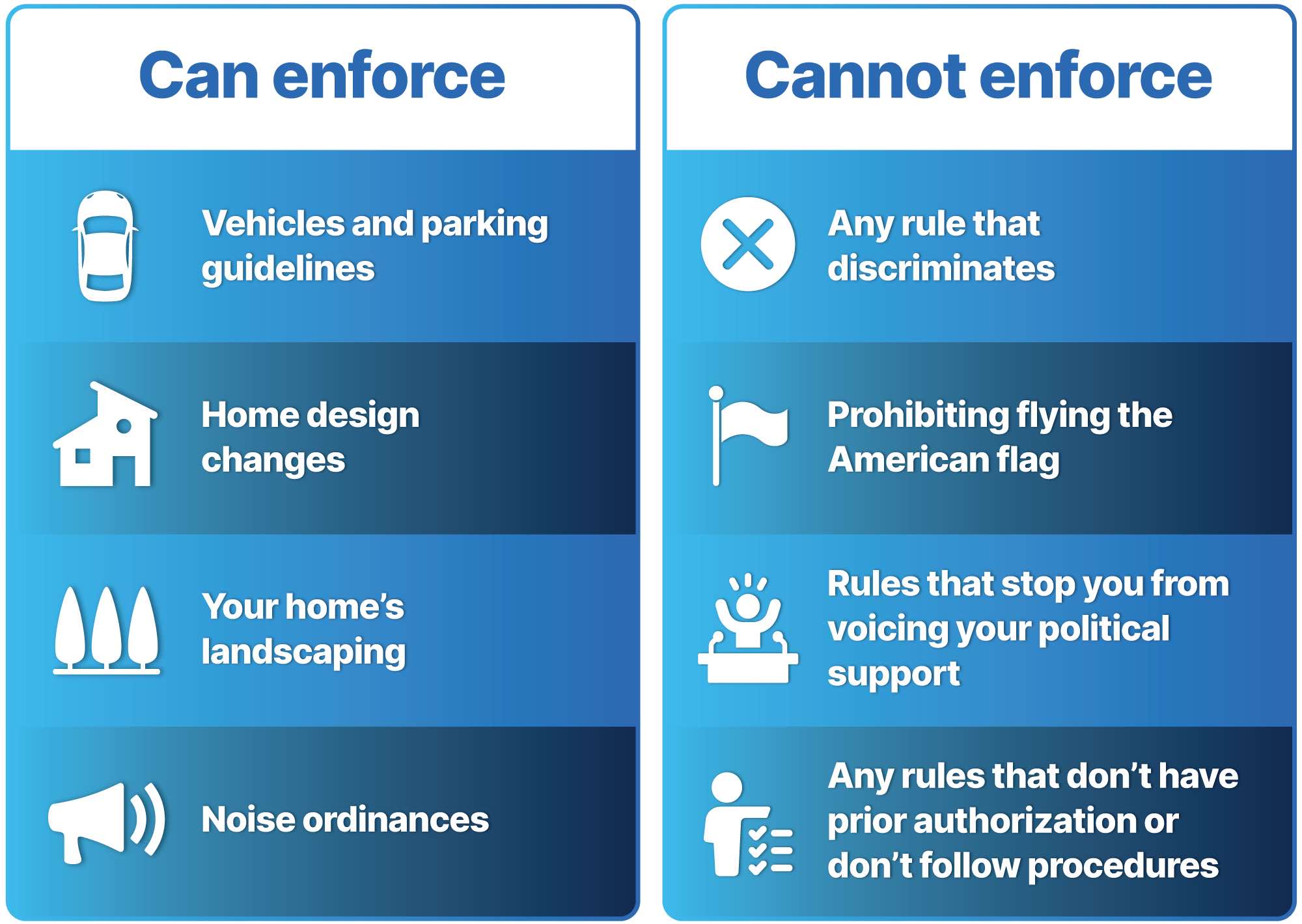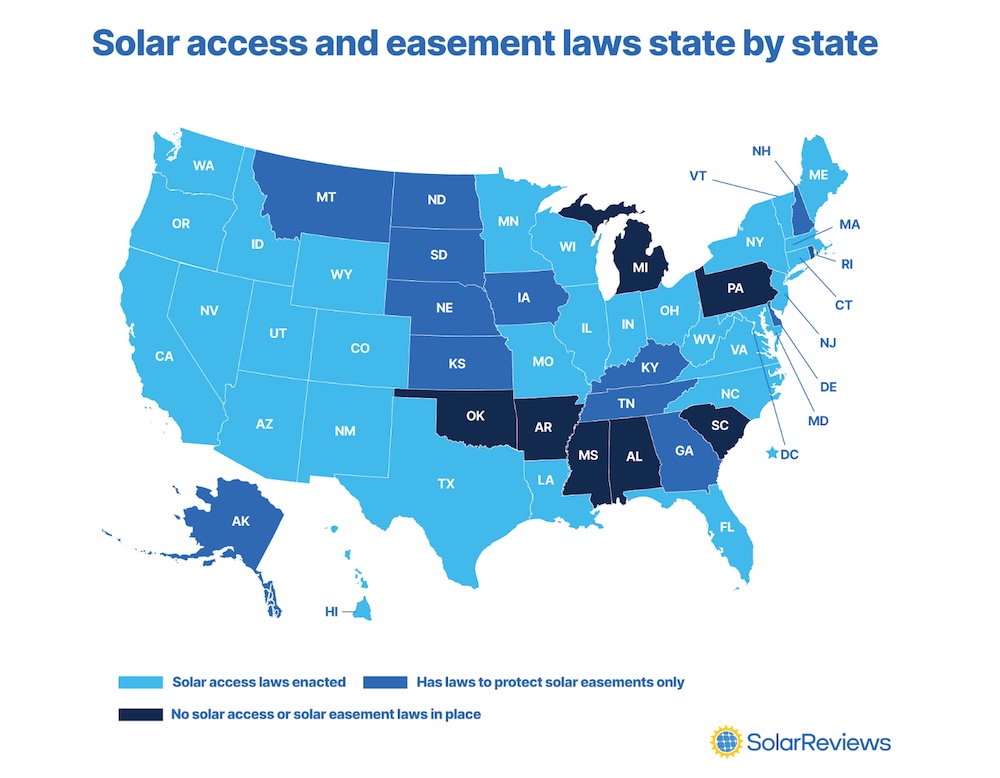Updated 1 month ago
Solar panels and HOAs: Know your rights
Written by
Jamie Smith
Find out what solar panels cost in your area
If your home belongs to a subdivision, planned community, or condominium building, you might be part of a Homeowners Association, or HOA. An HOA is put in place to protect the community, maintain property value, and ensure a nice, clean environment for the neighborhood.
So, what happens when you want to install solar panels? Because HOAs need to approve design changes to the outside of your home, you could face some trouble. Some common issues you might run into when trying to install solar panels with an HOA are fines, legal battles, or, worst of all – having to cancel your solar project!
If you currently live in or are looking to buy a home that is part of an HOA, there are a few things you should know – specifically if you’re looking to go solar.
Key takeaways
-
A homeowners association (HOA) can enforce rules and regulations on homeowners that live in their community – rules that can pertain to your home’s exterior, noise ordinances, parking regulations, and more.
-
Your HOA may deny your request to get solar panels installed in your home because they alter the look of your roof.
-
Some states have enacted solar access laws that prohibit HOAs from denying your request to install solar panels.
-
HOAs have been known to allow solar panels under a few conditions – like dictating their placement on your roof or the size of your system.
What can HOAs enforce?
Living in an HOA community comes with rules you have to follow, but there’s also a few things that they legally cannot impose on you. The chart below gives some guidance on a few things HOAs can and cannot enforce:

Can I get solar panels in an HOA?
HOAs often lump solar panel installations in with “home design changes”, with some HOAs going as far as explicitly banning solar panels! Exactly how difficult it is to get solar panels depends on the state you live in and the rules of your HOA.
It’s likely that you’ll need to get permission from your HOA to install panels to your home. When you install solar, your HOA has the right to make sure you or your installer have all the necessary permits to operate, your panels meet certain design requirements, or dictate the placement of your solar panels.
Some HOAs allow solar panels but only if they’re placed on the back of the home’s roof so it’s not visible from the street. This compromise doesn’t always work if the back of your roof faces north. This would mean your panels have less access to sunlight, leading to lower efficiency, and worst of all – lower savings!
Reasons your HOA might deny your solar panel installation
Here are some common reasons HOAs deny solar panel installations:
The ‘lower property value’ argument: Some HOAs argue that solar panels are unattractive and therefore will lower property value in the community – but it’s actually quite the opposite. Having solar panels can actually raise the value of your home.
Rules against home design changes: As we said earlier, HOAs can enforce rules against major changes to your home's exterior. Solar can be grouped into this since it is an addition to your roof.
Violating your homeowner's agreement: There could be specific rules outlined in homeowners agreements that prohibit rooftop solar.
But, HOAs may actually be breaking the law by denying your solar application.
What are solar access laws?
Solar access laws are passed to protect a homeowner's right to solar electricity production. These laws vary between states, and may even be different between counties and cities.
Solar access laws have helped many homeowners fight against HOAs who refuse to allow solar panel installations.
Solar access vs. solar easement laws
It’s important to know that solar access laws are not the same as solar easement laws. But, both are designed to help homeowners go solar.
Solar access laws are in place to limit building and zoning restrictions (such as HOA restrictions) on solar panels. Solar easement laws exist for homeowners to maintain their access to sunlight and solar power, but don’t necessarily protect you from HOA limitations.
For example, let's say you install solar panels but your neighbor has trees that grow too close to your roof and block the sun from hitting your panels. In this case, you may obtain a solar easement that instructs your neighbors to trim or cut down the tree that blocks your access to the sun.
These laws are both a state-by-state issue. If you live in a state with both solar access and solar easement laws passed, you’ll have more leverage to get solar.
Check out the map below to find out what protections you’re entitled to when you get solar in the U.S.

What if your HOA tries to prevent you from installing solar?
Regardless if you live in a state with solar access laws, your HOA might still put you through the wringer trying to get solar panels installed. Here’s a few things you can do if this happens.
Look over your state’s legislation on solar access and solar easement. One of the best things you can do to combat your HOA is to come back at them with concrete evidence that they do not have lawful grounds to deny your solar project. You can do this by looking into public records of your state’s law to see what protections you have.
Make sure you have obtained all of the proper permission to operate solar panels. One good thing to have on hand to present to your HOA is all the correct paperwork or necessary permits for installation. You can obtain these items from your installer prior to getting your panels installed.
Come to a compromise. Now, this doesn’t necessarily mean throwing in the towel and giving up your solar dreams. This might just mean having to get less panels, a smaller system, research solar shingles, or have your panels placed differently. However, if these conditions negatively affect your solar panel production and your overall savings – don’t lower your standards!
Interested in solar? Put your home details into our solar calculator to learn about cost, savings, and more!
Jamie is a Content Writer and researcher at SolarReviews. A recent graduate of La Salle University in Philadelphia, Jamie earned her B.S. in communications with a concentration in journalism, mass media, and public relations. Jamie has previously worked at a marketing company where she had the opportunity to highlight and promote small business owners through long-form stories and interviews. With a deep-rooted passion for creativity, Jamie stri...
Learn more about Jamie Smith